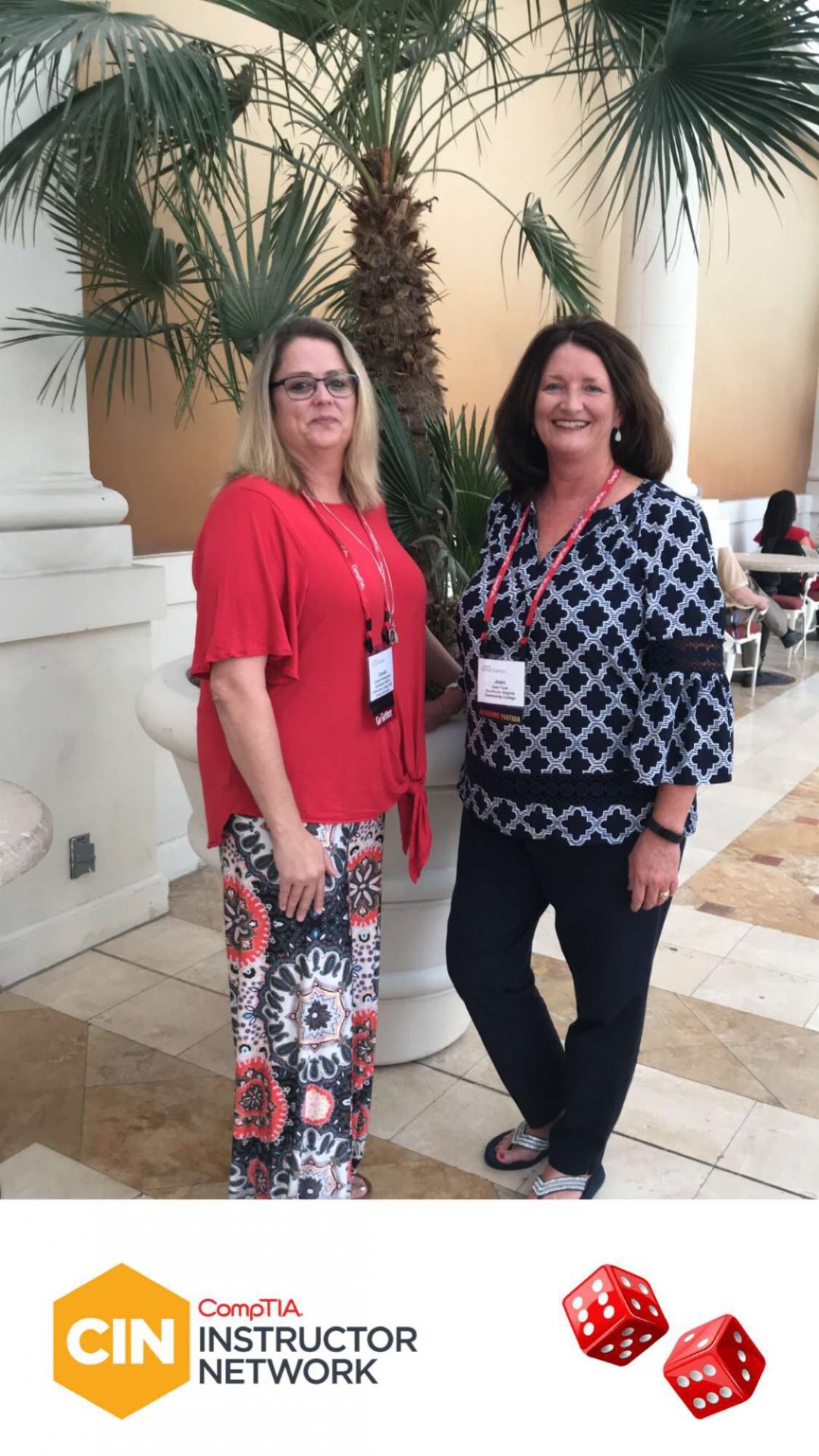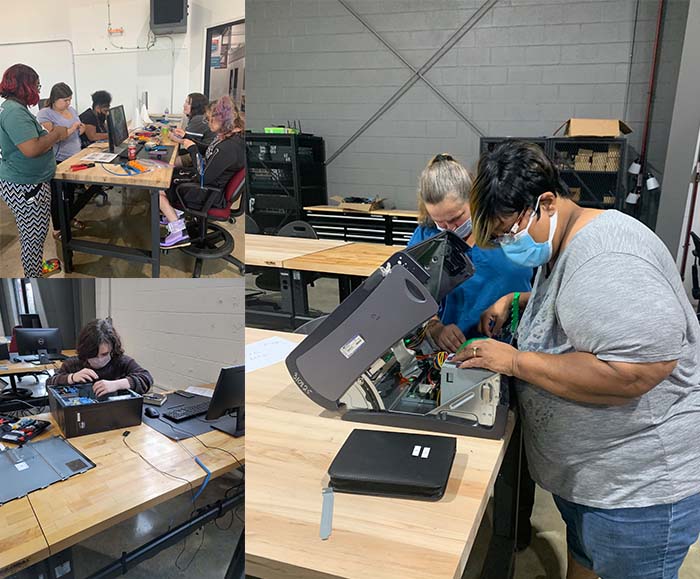CCN Focus Feature: Crystal Pendergrass, Southside Virginia Community College

Crystal Pendergrass pictured on the left and on the right is Joan Tuck, Information Technology Professor.
For the past two years, the National Convergence Technology Center (CTC) has featured blogs that introduced some of our professors and instructors in the Convergence College Network (CCN) community. The CCN is a select cohort of community colleges and universities from across the country that connects IT educators with a wealth of resources to enhance their programs. In this week’s Q&A blog, we’re featuring Crystal Pendergrassm, Program Coordinator for the Center for Information Technology Excellence (CITE) program at Southside Virginia Community College in Alberta, Virginia.
What do you teach? I am the Program Coordinator for the Center for Information Technology Excellence (CITE) program at Southside Virginia Community College. We are a Microsoft Datacenter Academy, and I oversee a Career Studies Certificate in Cybersecurity and Networking. Currently, I am also teaching our A+ Software course and IT Fundamentals course, along with prepping our Dual Enrollment students for their A+ certification exams.
How long have you been a teacher? I have been with Southside Virginia Community College for about three years. For over 25 years before working for Southside Virginia Community College, I provided training in various roles including teaching new employees with the Virginia Army National Guard, Department of Military Affairs on basic IT skills and Microsoft Office products and providing one on one basic computer skills training in my home for the South Hill Private Industry Council.
Did you have a job in industry before you became a teacher? For 20 years, I worked as a State of Virginia Employee with the Department of Military Affairs at Fort Pickett, a Virginia Army National Guard military training base in Blackstone, Virginia. I initially monitored calls and tickets for Facilities Support, then the Information Technology Help Desk, and eventually became the Manager over our IT technicians – overseeing support in areas of imaging, accounts, training, software, hardware and patching for all our staff and 50 locations across Virginia for most of my time there. In my last year with the Department of Military Affairs, I even took on a new role as a Server Administrator.
What sparked your interest in teaching? My experiences at Fort Pickett really drove my passion for teaching. I enjoyed helping our customers and users with basic computer tasks and identified the need to teach all new employees these concepts when they first started. I already had a passion for Microsoft Office so with my MOS certification, I provided training for our staff. We then developed a new orientation that after providing some of the first things you should know on our network, often minimized help desk calls in the future! I also love watching students learn something new and get excited about it.
What is the secret to successfully teaching IT to students? First, it is important to let students know that IT is so vast. And, in my opinion, most everyone has a skill that can be used in an area of IT. Whether it is creating a web page, maintaining a database, cabling, installing software, programming, or security – there is likely a place that will match up to a skill. Second, it is letting them know that NO ONE knows it all. The misconception that if you “work on computers” you can fix any problem is one I make sure I try to squash.

Program Coordinator Crystal Pendergrass’s students at Southside Virginia Community College taking a hands-on approach to information technology.
What’s the biggest challenge teaching IT? It is always changing and there are many ways to do something. I take on the personal challenge to help students taking our courses feel that finding a career in Information Technology is an obtainable goal. In our program, I strive to employ instructors who do the work in the “real world” and can share that knowledge and at the same time, prepare them for an exam that requires knowing the “RIGHT” answers. Unlike most of our fellow community colleges, we also incorporate the CompTIA exam as a required portion of our classes, proctoring the exam at the end. Their exam score impacts their course grade by a small percentage and on a scaled approach, but enough to help incentivize our students to work hard to pass the certification. So, balancing each class with covering exam objectives, staying up to date with complicated IT topics, sharing real world scenarios, introducing fun hands-on activities while also preparing them for what to expect when taking the certification exam is probably the biggest challenge our Program faces.
What advice would you give an IT student about to graduate and enter the workforce? Obtain and maintain IT certifications. Continue to grow by staying in tune with IT trends and changes. Those who are looking for jobs, I advise persistence. It is also a mix of confidence in your skills and knowledge and a willingness to learn. I would take a hard working, passionate and willing to learn employee any day over someone who walks in the door feeling like they know it all.
IT is always changing – how do you keep up with the ongoing evolution of IT? It is tough when your job is to know a lot of different areas and teach those subjects. I think it is helpful to pull in experts in the areas – we try to bring in staff from companies such as Microsoft for guest lectures and demonstrations. We all learn something when we bring in those who are currently doing the things we are reading and studying. Also, maintaining certifications through continuing education is a good way to make sure you are at least trying to stay aware of the latest trends. Honestly, becoming a member of the Convergence College Network (CCN) community has been a way to get it in the forefront of my mind – there is a wealth of knowledge shared among this community!
How do you see the IT landscape changing in the next five years? So much keeps changing and will always change. That is what most of us like about it. I think that we will continue to see cloud computing and remote services become even more dominant. I think newer technologies will arise to assist with some of the things we always feel like we must do in person or on site. As we face challenges such as COVID-19, we are seeing the need for improved education alternatives. There is no doubt as our technology advances and offers more ways to compute, communicate, store and exchange data that cybersecurity will continue to make huge advancements.
What’s your favorite recent student success story? We have so many student highlights at Southside Virginia Community College. We are very happy that many of our students are offered IT roles as they work through our program. Imagine a middle-aged female, part-time bus driver and Teacher’s Aid. With no IT background but great work ethic, she enrolled in our program and began her journey taking CompTIA A+ Software and then Hardware. When a 90-day paid internship became available at Microsoft, we recommended her after she passed her first A+ exam. She rocked the interview, was brought on for the internship and then started working with them shortly after as a full-time Datacenter Technician. She also continued the program, obtaining her MOS and MTA: Security Fundamentals certifications along with A+ and completed the Cybersecurity and Networking Career Studies. She was eager to continue learning even when she obtained the position she wanted. It appears she is a star and we just had her come in to share what she does at her job with our dual enrollment students. What a reward for us!
